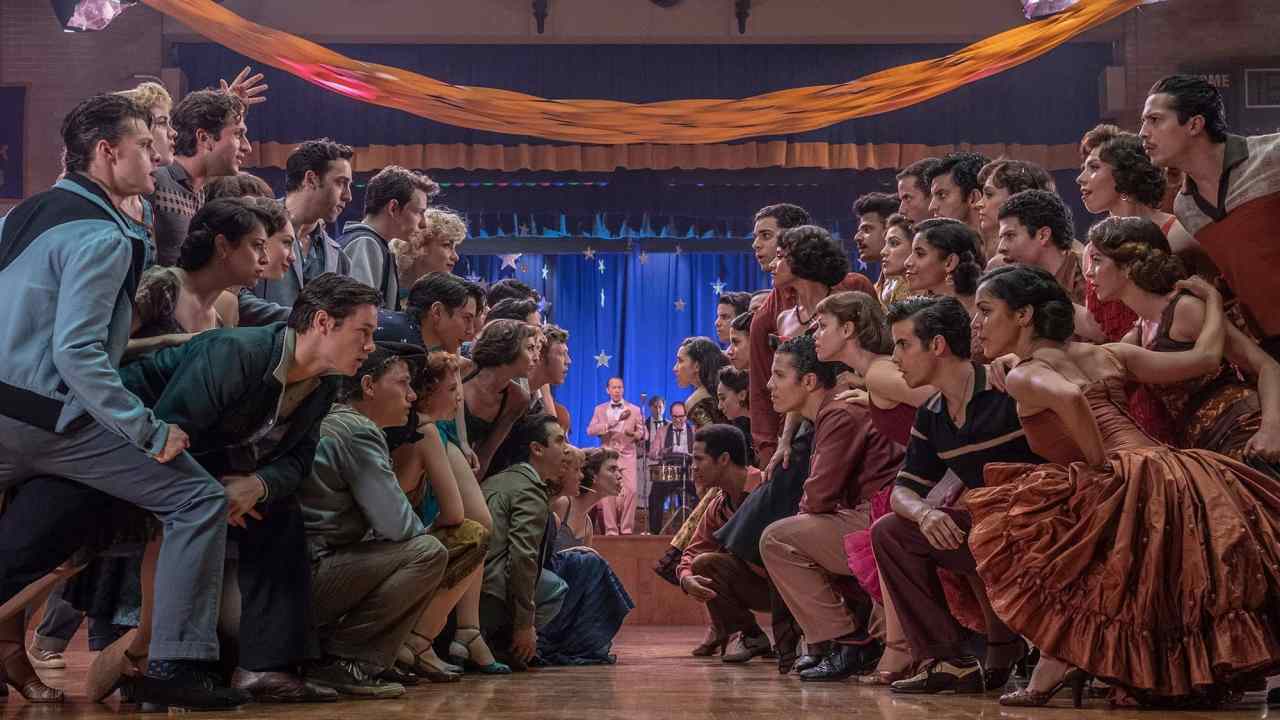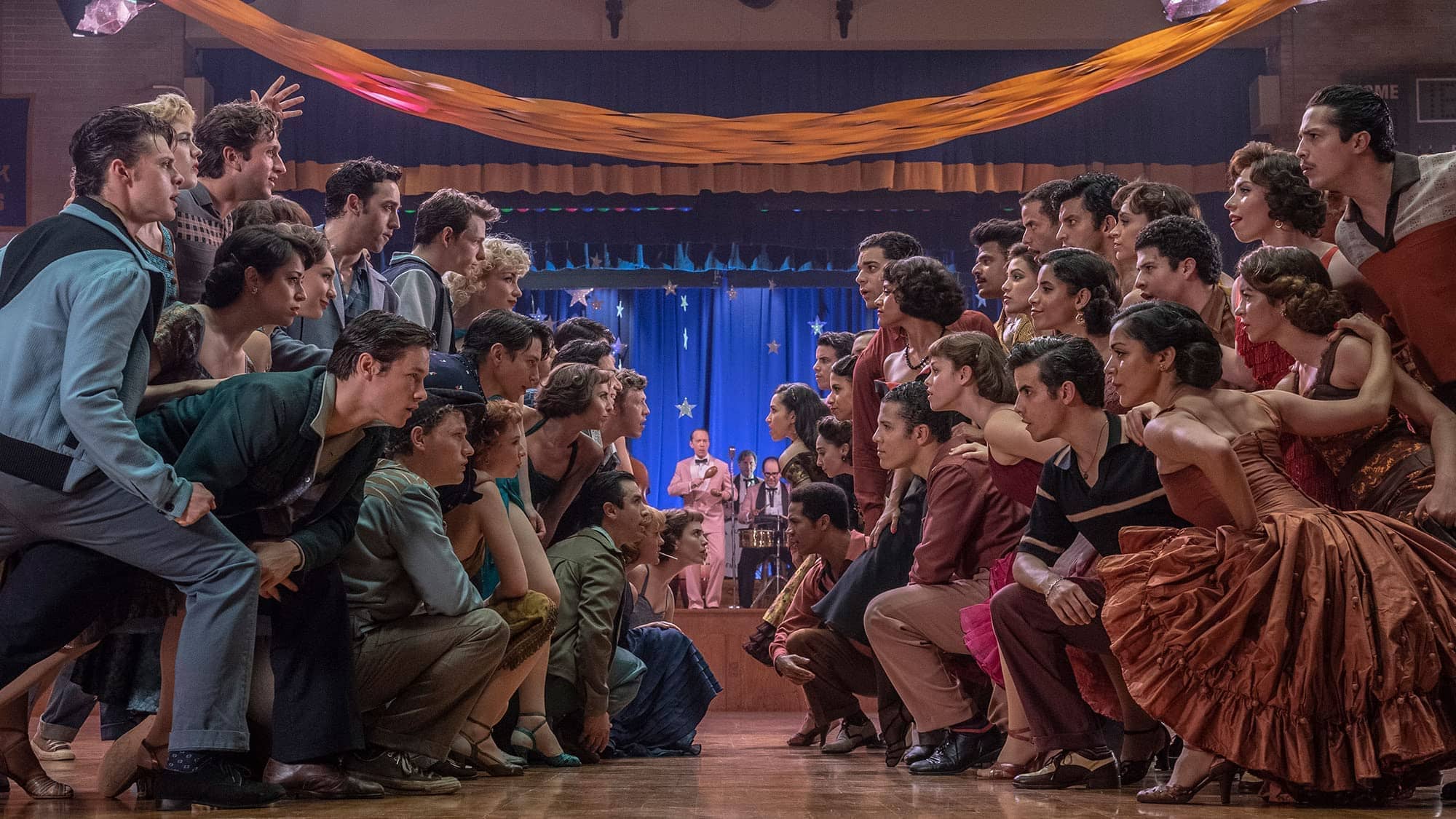‘Timing is everything’, as the saying goes. The death of West Side Story composer Stephen Sondheim must have seemed especially poignant to Steven Spielberg coming as it did a week before the premiere of the new film version of his acclaimed musical.
The composer surely would have delighted in the critical acclaim being accorded to Steven Spielberg’s remake. ‘He and I became good friends,’ the director told reporters at the film’s premiere. The musical famously updates Romeo & Juliet to 1950s New York City. Spielberg keeps the action in the 1950s, with his recreation of the city at the time earning special praise.
The timing of West Side Story’s release may seem spot on but Spielberg has never been especially interested in the zeitgeist, often favouring classic filming techniques, and conservative narrative themes. West Side Story is Spielberg’s first foray into directing a movie musical, although he dabbled with the form in the opening credits of Indiana Jones and The Temple of Doom (1984).
As you may recall, the film began with a terrific Busby Berkeley-esque take on Cole Porter’s Anything Goes, performed by Spielberg’s wife-to-be Kate Capshaw as nightclub singer/incessant screamer Willie Scott.
A consummate professional and master of the camera, Spielberg’s style doesn’t usually draw too much attention to itself, tending to serve the story, but will on occasion let rip with a display of directorial bravura. The filmmaker has an Old Hollywood command of framing, composition and mise-en-scène which has persisted throughout his career.
He has consistently eschewed the quick jump cuts that blighted the films of the 2000s; although not averse to the shock of the new, he has rarely been caught aping fashionable cinematic techniques in an attempt to compete with the latest crop of movie wunderkinds.
That’s not to say Spielberg is afraid of experimentation; he has perhaps become more adventurous as he’s grown older – many of themes (primarily the family unit) remain the same, but in markedly darker tones. The underrated Adventures of Tintin (2011) saw him direct a full-length animated feature, while he pioneered the use of CGI in Jurassic Park (1993). Spielberg ventured into the world of Virtual Reality gaming with Ready Player One (2018), a technical tour-de-force, but one that personally left me cold. Occasionally he has revisited similar subject matter in multiple movies; for example, the dull talkfest Amistad (1997) could be seen as a dry run for the vastly superior Lincoln (2012).
Saving Private Ryan (1998) also shows off his more experimental side, as Spielberg set a new standard for the depiction of bloody wartime conflict, its continuing influence seen to this day in movies such as David Ayer’s Fury (2014). Not since Hitchcock has there been such an effective practitioner of the art of cinematic tension (although Brian De Palma has his moments) – remember how skilfully Spielberg has stoked audience anxieties in a host of movies, including Duel (1971), Jaws (1975), Minority Report (2002), War of the Worlds and Munich (both 2005).
In another sign of his careful approach to film-making, Spielberg surrounds himself with talent he trusts behind the camera, including regular collaborators cinematographer Janusz Kamiński (all the director’s movies from Schindler’s List onwards) and composer John Williams. He also draws on a familiar pool of actors: Tom Hanks, Harrison Ford, Mark Rylance, Daniel Craig, and Tom Cruise have all worked with him in multiple pictures.
When people think of Steven Spielberg, the music Williams composed immediately springs to mind, certainly in the case of Jaws, Close Encounters, Indiana Jones, and Jurassic Park. Williams has scored most of the director’s films, with only a few exceptions (Sugarland Express, The Color Purple, Ready Player One and of course WSS). The 89-year-old has again composed the music for the fifth Indiana Jones movie (due for release in 2023), although this will be directed by James Mangold, with Spielberg producing. Often speaking with affection about how his mother, who was a concert pianist, gave him an ear for music, Spielberg is certainly a director who knows the power of the right film score. Although he maintains that he’s a terrible singer and dancer.
He’s by all accounts a quick and efficient film maker, a trait picked up from his early years in TV, having clearly learnt lessons from the overruns that plagued Jaws and star misbehaviour on Close Encounters and the WWII comedy mega-flop 1941 (1979). Spielberg effectively became his own boss in 1984, forming Amblin Entertainment with producers Frank Marshall, and Kathleen Kennedy.
Of course, it wasn’t all was plain sailing from then on – there were still ructions (allegedly with Julia Roberts when filming Hook), but he was at least largely free of studio interference.
Unfortunately, this new-found freedom led him into directing worthy-but-dull movies The Color Purple (1984), Empire of the Sun (1987) and Always (1989), a pointless remake of A Guy Named Joe (1943) which had pretensions to being Spielberg’s contemporary take on Powell/Pressburger classic A Matter of Life & Death (1946).
For me, Spielberg is really at his best when making well-crafted pictures that hark back to another era of less trivial fare; movies such as Munich, Lincoln, Bridge of Spies and The Post. Ironic, considering the director kicked off the whole blockbuster behemoth with Jaws back in 1975.
Thankfully, age has also made Spielberg less sentimental; there are plenty of manipulative and unsubtle moments in his earlier work where he has been at pains to force a particular reaction from audiences, famously with the final scenes of ET, Schindler’s List, Private Ryan, A.I. Artificial Intelligence and The War Horse.
So what next for the director after West Side Story? Spielberg returns to his Arizona childhood for his next movie, semi-autobiographical drama The Fabelmans, co-written with Tony Kushner. The film represents a change of pace for him, and for audiences expecting a Spielberg spectacle, but as the importance of family is the underlying theme in many of the director’s pictures, it’s maybe not such a pivot after all.
West Side Story is released in UK cinemas on Friday 10 December







Comments